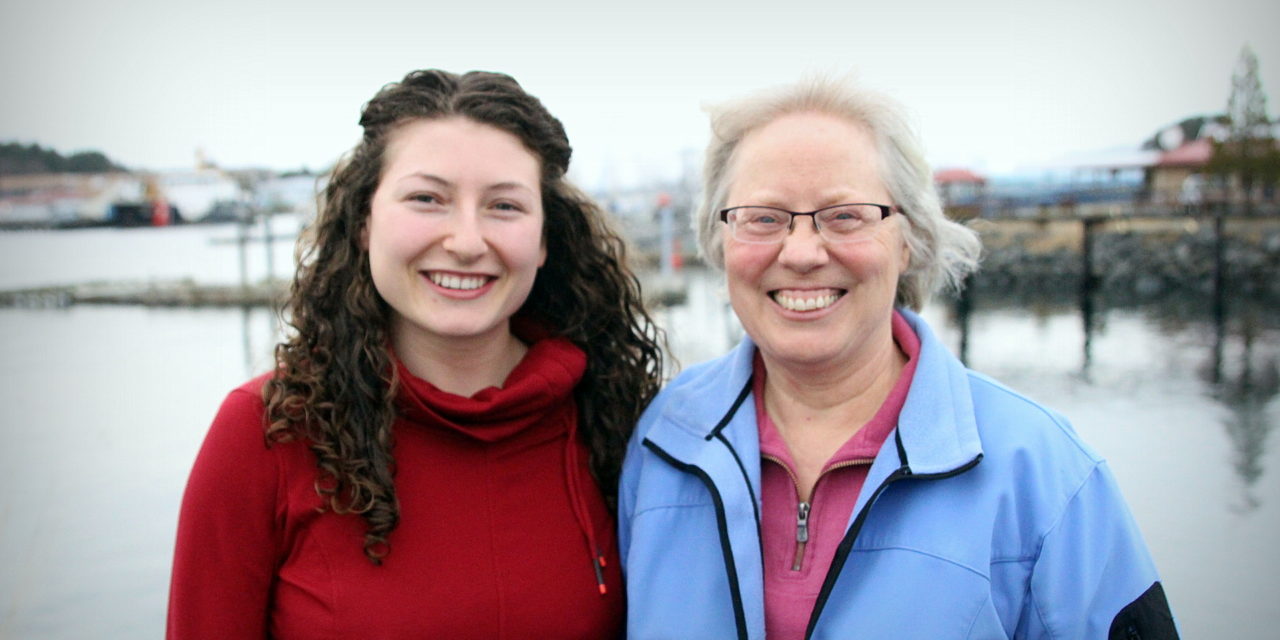
Iris Nash fell in love with fishing her very first day on the water. She loved it so much she married a fisherman. The two starting working together a few years ago and now run their own boat in Sitka.
“I find myself constantly identifying as being fisherman, and then realigning myself and being like, ‘I don’t really do a whole lot of money making anymore. I haven’t pulled a whole lot of fish in the last year,’” Nash admitted.
That’s because Iris is a new mom. Her son turns two this year and she’s pregnant with her second child. To answer some of her questions about balancing being a mom and co-managing a fishing business, Iris sat down with Sarah Jordan. Sarah also married into a fishing family and raised her own two sons aboard the family boat.
Iris: When your kids were old enough to be out on the boat with you, what did you do to keep them entertained?
Sarah: Well, at the point that there were two of them, they always played together. Although, sometimes it would start out fun wrestling and then the boat would lurch and someone’s head would smack into something and then they would be crying and then I’d have to separate them. We had to have this no wrestling rule, which they didn’t like. I’d say, “Hey, if I have to separate you, somebody’s going in the fo’c’sle and somebody’s going on the back deck and it’s raining, so you don’t want to be the person out on the back deck.”
They’re really both excellent readers because that was one of the main activities on the boat– you read all your library books and then you read all your brother’s library books and then you read your mom’s library books and you read your dad’s library books. So , yeah, the reading was a really important aspect of it.
Iris: Were they occupied enough where you were able to help more on deck? Was that something that you were interested in? Were you wanting to be more on deck?
Sarah: Oh, I was always the deck boss. That’s what I wanted to do. I never wanted to steer the boat. A lot of wives and women on boats, that’s kind of their main job, but I didn’t enjoy it. I just wanted to be out landing fish– just land fish and clean fish.
Iris: Yeah, I’d much rather be in the pit, just doing my own thing, head down, but there are these really strong gender divisions. I feel like I signed on for a life where my husband is ultimately in charge of all things boat.
Sarah: There’s a built-in safety thing. When the skipper says, “Go do this,” or “I need you to do that, right now,” you don’t stop and say, “but I did it last week so it’s your turn to do it now and it’s not fair.” No. It’s safety.
Iris: Did you find the transition [from] deckhand to mother to be really challenging mentally, that transition of roles?
Sarah: After I got to the point where, for a lot of reasons, I didn’t physically want to be on the boat, I wanted to be doing shore support– the first year our accountant called us and he said, “I need your days at sea,” for doing income taxes. And I said, “I didn’t have any days at sea last year,” because you get this grocery allowance. I said, “I’m shore support. I’m only changing the oil on the boat and bottom painting and laundry and groceries and cooking casseroles and doing the books.” And he goes, “Only? Sounds like you’re the glue that’s holding the operation together.” And I [said], “well, thank you.”
Iris: That is nice. That’s a nice reminder.
Sarah: You know, when you’re going through it at the time it’s like the days are long, but the years go by fast. When your kids are adults, they’re thankful that they know how to work hard. We don’t get paid by the hour. You get paid by the pound, and I just know that both of my sons know the value of hard work and they know that the harder they work, the better they do. On the boat you’re always instilling in them, you know, okay you get this job done [and then] you look around. Something always could be scrubbed.
Iris: Yeah, just instilling that in them through real life. Nowadays I feel like I’m a pretty young mother– I’m 23 and my son is a year and a half and I feel really good that my son will remember the day that we pay off our boat. That was the first loan my husband and I ever took out and we did that together. We made this for ourselves.
Emily Russell is the voice of Alaska morning news as Alaska Public Media’s Morning News Host and Producer.
Originally from the Adirondacks in upstate New York, Emily moved to Alaska in 2012. She skied her way through three winters in Fairbanks, earning her Master’s degree in Northern Studies from UAF.
Emily’s career in radio started in Nome in 2015, reporting for KNOM on everything from subsistence whale harvests to housing shortages in Native villages. She then worked for KCAW in Sitka, finally seeing what all the fuss with Southeast, Alaska was all about.
Back on the road system, Emily is looking forward to driving her Subaru around the region to hike, hunt, fish and pick as many berries as possible. When she’s not talking into the mic in the morning, Emily can be found reporting from the peaks above Anchorage to the rivers around Southcentral.




